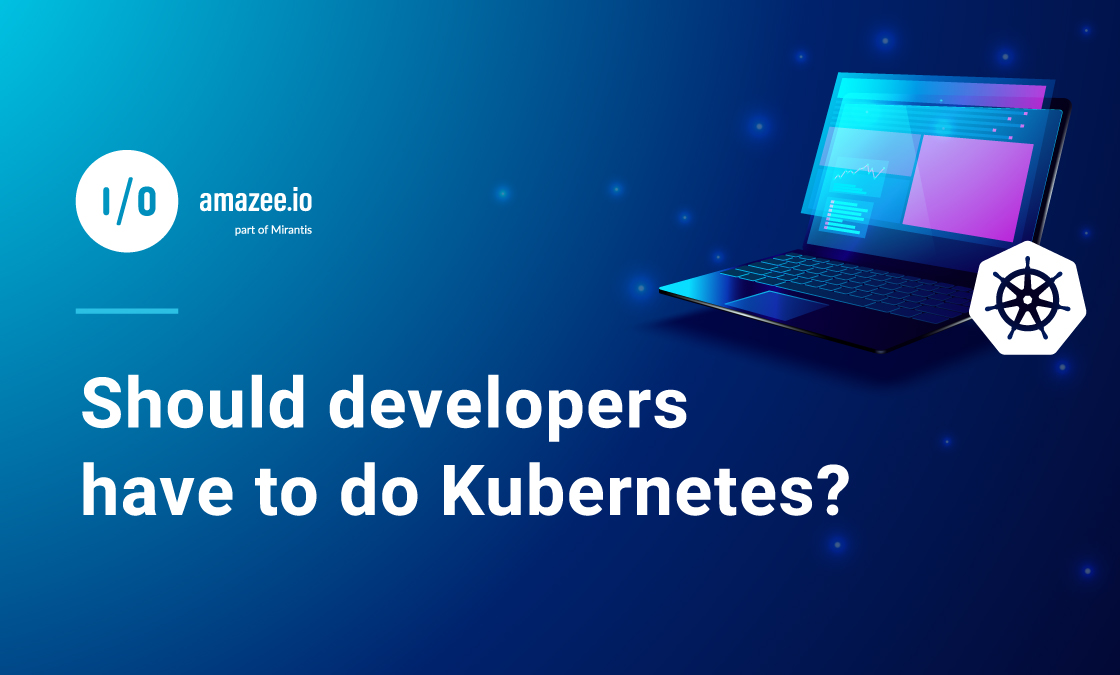Michael Schmid
|
Jan 24, 2023
|4 min read
Search Topic

Here’s a popular, and correct, opinion: Kubernetes is awesome. It’s a game-changer for modern businesses, and it allows teams to do things that were once thought to be impossible. Kubernetes simply makes it easier to host and run sites and applications - in theory. Theoretically, Kubernetes is close to perfect.
But when it comes to actually managing Kubernetes and completing the necessary tasks to use it, that’s another story.
In fact, the tasks related to Kubernetes might be making your developers’ lives significantly harder.
This is because Kubernetes, by nature, is not what developers signed up for. It’s simply not what they want to be doing. What they want to be doing, likely, includes coding, creating, and developing applications.
“Doing Kubernetes” looks a whole lot different from your developers’ ideal day. It would include managing and securing containers, hassling with IP addresses, networking, and storage, and constant updates, corrections, and troubleshooting. These are necessary parts of using and running Kubernetes, but they’re time-consuming. They’re more on the operations side. And most developers report that they’re not interested in this type of work.
The pressure to “do it all” isn’t new to developers. Many feel constant pressure to be a DevOps engineer, a full-stack developer, and to master each and every skill that a software engineer could have to become a “jack of all trades.” And what’s more, many companies want to hire “full-stack developers” because it seems like they can get more work done with fewer people.
This is a recipe for developer burnout and unhappiness.
Developers aren’t infrastructure and operations experts, and they shouldn’t have to be. Those are different areas of expertise and specialty. When people in most other professions are asked to take on multiple roles at once, they protest, asking for a raise, a new title, or to assign some of the new work to another person. But for some reason, developers exist under the expectation that they should have to “do it all” to keep up with what’s widely expected from the industry.
But at amazee.io, we believe this mindset is harming developers, and as a result, more developers are quitting their jobs and even leaving the field entirely! This is creating a tough situation for companies and recruiters, who can’t fill positions.
We shouldn’t demand the world from people who excel in their own lanes. And developers certainly do that: They're mission-critical for business development, and they should be allowed to do what they do best without taking on the world.
Yes, there are developers out there who are “unicorns,” and who can be full-stack, DevOops, Kubernetes rockstars and not lose any sleep.
But that’s simply not realistic for 90% of people.
For most developers, focusing on strong skills in just one area is likely the best way forward, both for them and their organization. That’s the way that most developers deliver the best value.
So to summarize this point, we need to be creating a safe environment for developers to do what they do best, without burning them out.
Now let’s talk about how.
So we’ve established that developers are likely not the right people to be managing, running, and overseeing your Kubernetes efforts. They simply can’t own it, because they’ve got enough to do.
But at the same time, you don’t want to hire a bunch of new staff just to oversee Kubernetes. You live by Jeff Bezos’ two-pizza rule, and you want to keep your team small and agile. We embody this mindset as well - smaller teams work better, while teams that are overgrown struggle to communicate and create value.
Don’t despair: There IS a way to add skills to your team without adding more people, and we call it “platform engineering.” It may go by other names, like PaaS, ZeroOps, which we love, or DevOps-as-a-Service, but basically here’s what we mean: You can add strategic platforms and tooling to your team in layers to add the specific skills you want - without increasing headcount.
This infuses small teams with the skills and help they need to succeed, and it pulls developers out of crisis-mode burnout.
Kubernetes is a great use case for a PaaS or “as-a-Service” offering like amazee.io’s Lagoon, because it’s such a specialized skill. It also provides a critical abstraction layer that provides developers access to Kubernetes without ever really having to learn it!
So you could get all the results and ROI you want to see from Kubernetes without ever having your team learn it or do it. It’s also much more cost-effective to “hire” a PaaS instead of people because Kubernetes experts are highly specialized and trained - so they’ll cost you handsomely.
Platforms-as-a-Service like Lagoon can help your team develop applications quickly, use and secure Kubernetes without a significant time or money drain, and keep your small teams agile. Interested in learning more? Contact us for a chat!

